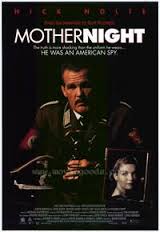
MOTHER NIGHT
US, 1996, 110 minutes, Colour/Black and White.
Nick Nolte, Sheryl Lee, Alan Arkin, John Goodman, Kirsten Dunst, David Strathairn.
Directed by Keith Gordon.
Based on a Kurt Vonnegut novel, this is a serious satire on war and identity. Nick Nolte, in an excellent performance, plays an American who by chance found himself in Germany before and during World War II and is persuaded by the American government (in the form of John Goodman) to agree to do anti-American radio broadcasts which will secretly give allied information. He does it so well and it is so secret that at war's end, he can only fade into obscurity in a dingy New York. And then things happen, including Russian spies and double agents, a reappearance of his dead German wife, support from respectable religious racist Neo- Nazis and abduction by the Israelis and his being incarcerated with Adolf Eichmann. I would like to say that it worked for me, but it did only in parts. Ideas were good, so were performances (Alan Arkin, Sheryl Lee), but it did not gel into a satisfying whole. Curiosity piece with fascinating ideas.
1.The novels of Kurt Vonnegut? His perspective on American and European history of the 20th century? Ironic and black comedy? Adaptation for the screen? The film version and the spirit of Vonnegut's writing?
2.His perspective on the Holocaust? His own history of the bombing of Dresden? American attitudes towards World War II, towards the Holocaust? The foundation of fact? The fiction and satire?
3.The title, its focus? The quotation from Mephistopheles in Faust?
4.The colour photography/black and white? To indicate the times and the moods? Israel, Germany, New York City? The musical score?
5.The structure of the film: 1961, Howard Campbell's arrest and internment? His typing his memoirs, the charges? The flashbacks for his story? His being found guilty? Hanging himself?
6.Nick Nolte as Campbell? The framing sequences? The flashbacks, Nolte as an American type? The American and German backgrounds? His life in Germany in the '30s? The playwright, his success, being feted, the performance of his plays? His love for Helga and their marriage? An assured and competent playwright?
7.John Goodman as Wirtanen? His casual approach to Campbell? The approach and its credibility? American- German relationships? Campbell being asked to spy, to become a Nazi? His rise and rise amongst the Nazis? His real personality, his assumed persona, the assumed person taking over the reality? The nature of his broadcasts, his skill in communicating (and the background in fact of Lord Haw Haw)? The coded information being given to the Americans? The credibility of this kind of double agent work?
8.Howard in himself, his performances, the creative playwright making his scripts? His enduring the war? The impact of the end of the war, the devastation of the Nazis? Helga and her death? Howard and his being arrested? The British and American officers and their treatment of him? His being spurned? His holding his secret? His being saved from execution by Wirtanen?
9.The passing of 15 years, New York City, the early '60s? Campbell and his obscurity? His apartment, George as his neighbour, their friendship, discussions, sharing? His own secret and his sense of failure?
10.The character of Helga? Her place in the theatre, in German society? Her love for Campbell, the marriage? The war, its aftermath, her death? Living in Campbell's memory?
11.The visit from the fascists: Lionel Johnson and his organisation? The Iron Guard of the White Sons of the American Constitution? The priest and his being chaplain to and American fascists, the chaplain of the gun club? The African American - Gestapo uniform, the Black Fuhrer of Harlem? Caricature of the American extreme Right? Their fawning on Campbell? His being their hero? The irony in the caricature?
12.Alan Arkin as George? A genial man, in the neighbouring apartment, his friend, the telling of stories? The irony of the truth? The Communists and their spies? Trying to persuade Howard to go to Moscow? His escape?
13.The arrival of Resi? The audience's having seen her as a child in Germany, her devotion to Howard? The same actress playing Helga and Resi? Her pretending to be Helga, re-creating the marriage, the love? Howard believing her? The truth? Her role as a spy for the Communists? Her failure, her suicide?
14.Howard Campbell's odyssey? Standing in the street immobile? Not at home in the United States? Not at home in Germany? George and his escape?
15.Howard Campbell and his surrender, Mr Epstein the neighbour? His going to jail, the visit by Wirtanen? A further sense of failure? His typing his memoirs, his reasons for killing himself, hanging himself?
16.Howard Campbell and his being trapped by circumstances, by history, by the Germans, by the Americans, by his personality, by his creativity?
17.Vonnegut's perspective on World War II? On Nazi society? On the role of the United States? The aftermath? The Israelis and their punishing Campbell? Vonnegut's black humour and his sense of detachment in his portrait of the war and its aftermath?